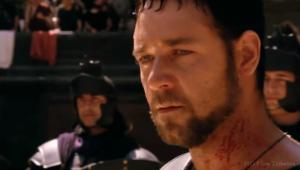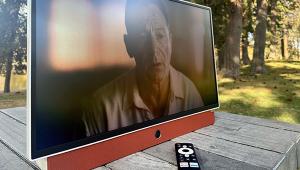If you did your research you would have come across the use of the word Frack in the 1978 version of BSG. The word was shortened in the later incarnation but was original to that series. So your end of piece should be revised to show that the language of 1978 influenced more modern shows and not whip up a false narrative of word/ idiom theft.
Farscape Remembered

One that did end well is my candidate for the best ever. Over the recent holidays I revisited the first season of Farscape on Blu-ray. It's also available for streaming on Amazon Prime. A space opera like no other in my experience, Farscape was a joint Australian/American production from The Jim Henson Company and Hallmark Entertainment.
The series was produced in the fledgling days of high definition. Seasons 1-3 were therefore shot in the 4:3 aspect ratio common to shows of that era; only season 4 is 16:9 (though the Amazon Prime versions of the first three seasons are...yuck...panned and scanned to 16:9!!). And while the series was filmed, which would have allowed it to be rescanned in high definition for a video release, the film elements were lost somewhere along the way (why does that happen so often!?). The Blu-ray releases were therefore upscaled from standard definition using the videotapes made for broadcast. Fortunately, those tapes utilized the PAL format common in many parts of the world, including Australia where the series was shot (Australian accents are heard throughout, but mostly from one-episode or minor characters). PAL's standard definition offers roughly 100 more lines of vertical resolution than our NTSC's standard of 480. Thanks to that, the image quality in the upconverted Blu-ray discs is good apart from (sometimes significant) black crush in the darkest scenes in some episodes, though brighter scenes are fine. The Blu-rays' DTS-HD Master Audio sound is often surprisingly good for television, though not up to the best 2021 film standards.
Three separate boxed sets of the four seasons have been released, the latest in 2019. I have only the first two. They appear quite similar both in content and audio-video quality, though I marginally prefer the second release, the 15th Anniversary Edition. But neither of the first two sets include the TV movie produced to wrap-up the story after the series was cancelled (though the 2019 release reportedly does). That movie, The Peacekeeper Wars in full widescreen (though still not in HD), was produced after the fourth season's cliffhanger ending and comprised (in highly condensed form) what was intended to be, pre-cancellation, the series' fifth and final full season. Fans were outraged at that cancellation, which ended the saga on an unresolved downer, and their efforts helped in the decision to produce the film and avoid the fate of so many TV series that either end badly or merely peter out.
Thanks to the movie, clocking in at three hours, Farscape had a well-deserved and richly satisfying resolution. Unfortunately, The Peacekeeper Wars was not available on Amazon Prime when I looked. I do have it on DVD, but not the available Blu-ray. The DVD is adequate, but significantly softer than the Blu-rays of the series itself, plus some of that black crush as well. If on-line viewer comments are correct, however, the Blu-ray of the movie is no better than the DVD and possibly worse. But it's still infinitely better than ending the story without it.
The meat on the bones here is the series itself, and (for me at least) definitely worth fighting through some of the uneven quality of the video releases. It's by turns bizarre and fascinating. An earth astronaut, John Crichton, is sucked into a wormhole on a test flight and ends up near a huge, alien-like ship under attack. He's sucked into the ship, called Moya, which turns out to be a part mechanical, part live organism—an original concept for filmed science fiction. There he finds several escaped prisoners of various alien races, plus a female from the race, called the Peacekeepers with more than a little irony, that was attacking Moya. That race is humanoid (visibly indistinguishable from Crichton). As Crichton remarks in one of his many choice comments throughout the series, "Boy, did Spielberg ever get it wrong!"
One of the cleverest concepts in that first episode answers the proverbial sci-fi conundrum: how can all these mixed alien races talk to each other so easily? The answer here: translator microbes that enable instant communication between those speaking other languages.
Farscape, like most TV series, can be uneven, but its efforts are ambitious. Season One is largely about the fugitives' efforts to evade the Peacekeepers. More so than in later seasons it falls into the "monster of the week" trap. But it's never uninteresting, and things get cooking later in the season as the series' prime villain enters the picture and the episodes become more interdependent. From there on it's a wild ride until the end, and needs to be watched in order.
The production design is extremely high for a series originally broadcast on the Sci-Fi (now SyFy — gag) channel. The series' real strength, however, is in its characters and how, though often at loggerheads, they band together into a close family. The scripts are uniformly well written and the acting superb. While it's primarily an ensemble show, the characters of John Crichton (Ben Browder—the only American actor present in every episode) and the female Peacekeeper Aeryn Sun (Australian actress Claudia Black) who reluctantly joins the group. Browder and Black later joined the cast of Farscape SG-1 (as different characters) in that show's final seasons.
Oh yes, not to forget, the show also features two muppets (thus the Jim Hudson connection). That appears to be a sticking point with some potential viewers, but it's their loss. They're two of the shows more interesting characters: Rigel XVI (by his constant reminder, the deposed Dominar of the Hynerian Empire) and Moya's pilot, cleverly named...um...Pilot. They're both superbly voiced, and if you can't see them as real as any of the other characters in the show after an episode or two you need an immediate imagination transplant (you likely don't like animation either). But this doesn't mean that the show is for kids. In fact, it can occasionally be sexy (but not overtly so) and some parents might find it inappropriate for pre-teens. Ditto on the cursing, limited mostly to variations on the real thing. Frell (or frelling) is a stand-in for—I think you can guess. This idea was later ripped-off by Battlestar Galactica as frak or fraking.
- Log in or register to post comments


I saw it on Amazon Prime and it did bring back positive memories. I thought it was well done, particularly for its time. It did suffer from some standard tropes in the way that many series do. D'Argo the great warrior usually not doing well in a fight i recall being one of them. I very much appreciated that it got a proper ending.
For best Sci-fi series, I might rank it third or fourth: (1) The Expanse (2) Battlestar Galactica reboot, (3) Dark Matter; (4) Farscape. I grew up on ST:TNG, and still enjoy it - especially when cut down to the core Picard-centric episodes. But it still is no longer in my top 4.

I forgot about Firefly. It was a bit uneven, but there were a couple of outstanding episodes in that short lived series. i still go back to re-watch every few years.

The Expanse is certainly up there with its excellent story and visuals, but Babylon 5 is the series which I and many others consider to be the best TV sci-fi ever filmed. Sure the effects and costumes, maybe the acting, aren't that great, but they did what they could with a small budget. All 5 years were planned from the very beginning which pulls it away from the pack.

I missed babylon 5 during its run. I would love to go back and watch it, but it's not available on any streaming services up here in Canada.

I don't know if it's available in Canada, but Babylon 5 is going to by on HBO Max here in the US on Jan. 26th. This is the first time in a LONG time it has been available to stream (other than by purchasing individual episodes or seasons).
Years ago I found a really cheap DVD collection (I think it was $60 or so for all five seasons) that was actually an imported version intended for the Hong Kong market. (still all in english) That might be the best way to watch these days if streaming via HBO Max isn't an option where you live.

HBO Max is not available in Canada. A lot of HBO original content comes to Crave, a streaming service up here pioneered by Bell. Babylon 5 is not listed as coming to Crave in January, but I'll keep watching.

Thanks! I own this on BD along with Peacekeeper Wars. I should really re-watch it before work picks up again. I really enjoyed it!!!































































